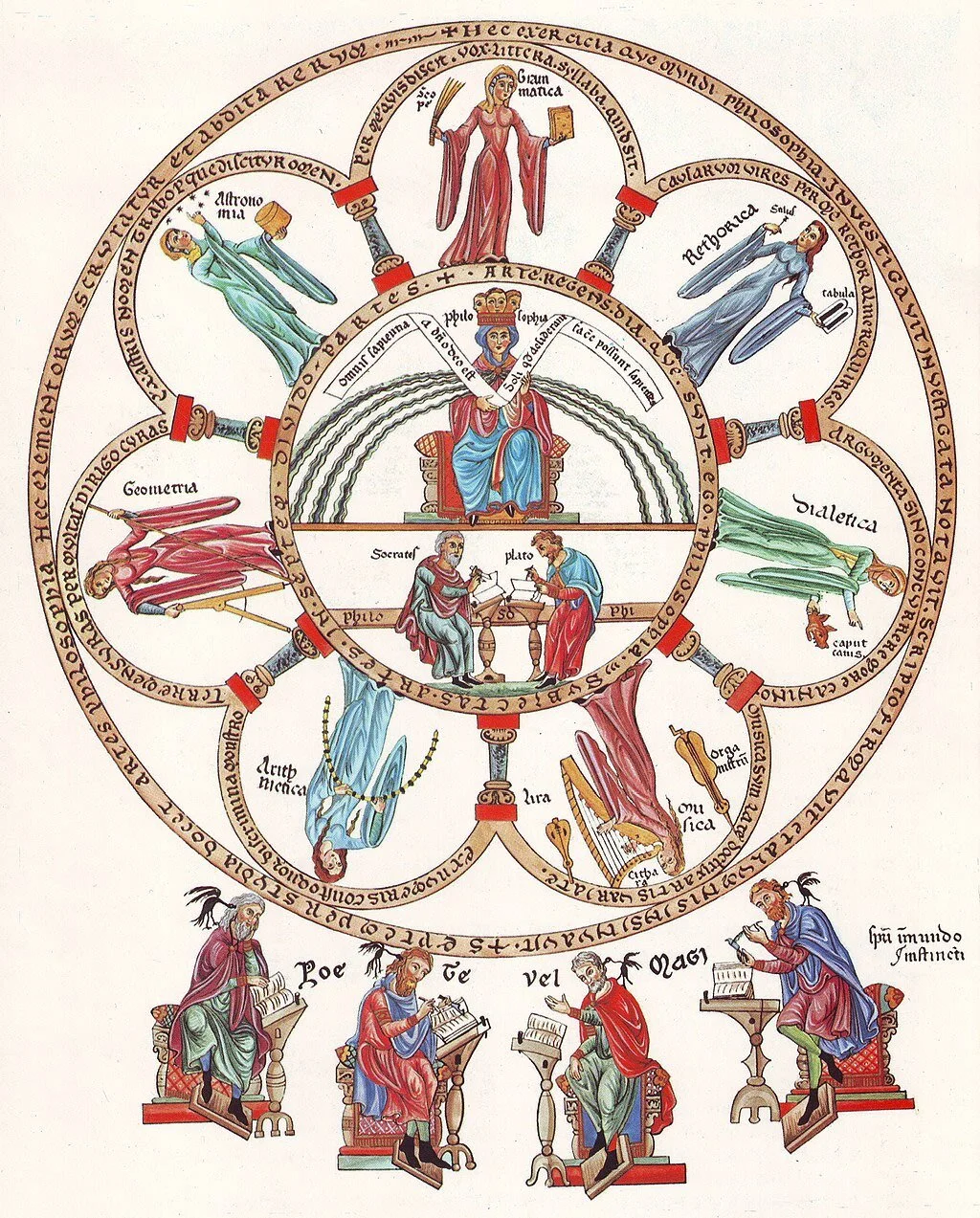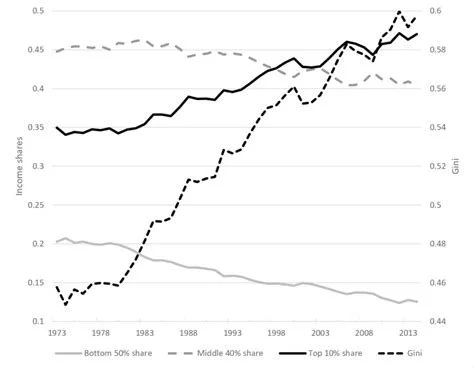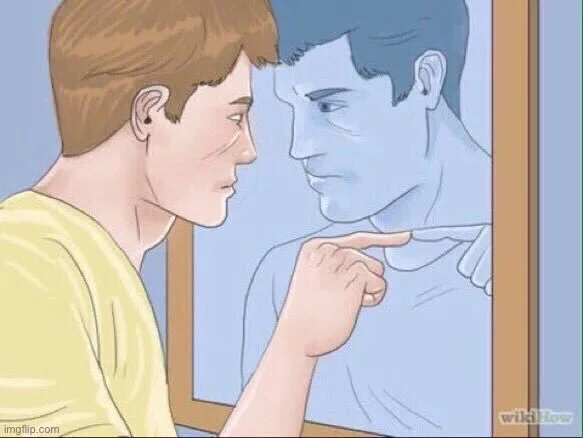Stoicism as Salve
n.b. If you have yet to do so, I invite you to visit my about page to understand the purpose of these writings.
n.n.b. If you enjoy White Noise, if it prompts a reflective ahh or sarcastic harrumph, I ask that you share it with both friends and enemies, respectively, via the button below. I promise that many more creations, reflections, and pensées are forthcoming.
Above: Philosophia et septem artes liberales (Philosophy and the Seven Liberal Arts), as illustrated in the Hortus deliciarum (Garden of Delights).
As an undergraduate at Notre Dame, one of my two majors was the Program of Liberal Studies. Affectionately known as “Probably Law School” and “the $200,000 Book Club” by fans and detractors alike, PLS represented Notre Dame’s take on a classical Liberal Arts education.
Recently, I received a note from the Program requesting graduates’ personal reflections on the COVID-19 pandemic. The missive read:
“As the coronavirus pandemic reshapes life across the globe, the disruptions, challenges, struggles, and powerful moments of solidarity in our communities are also highlighting questions that lie at the heart of a liberal education.
Some are general questions: What constitutes a good life? What are the demands of justice? How can we find meaning and hope amidst suffering? What may God be asking of us? Some are much more particular: How am I going to make it through today, this week, or this month? How can I cope with the loss of a family member or friend, the loss of a job, dramatic isolation, or a sudden new set of responsibilities, such as caring for children while also trying to work full-time from home?
Whatever the questions, our conviction is that a liberal education can help us grapple with them in a richer, deeper, and more reflective manner. With that in mind, the Program is soliciting short, personal essays that bring your experiences during the pandemic into dialogue with the kind of intellectual formation you pursued in PLS. Our hope is that these essays will stand as a testimony to the continued value of liberal education amidst what is poised to be the most dramatic upheaval in American life that most of us have experienced.”
I lent my voice to the chorus of reflection and share my thoughts with you below:
Stoicism as Salve
As a highly contagious virus wrought havoc the world over, men, women, and children took shelter en masse, seeking safety and refuge indoors. Barred from the distractions of the quotidian: holidays to far-off places, gatherings with family and friends, jaunts to sporting events and concerts, individuals from all walks of life joined together in their solitude, confined by the four walls of apartments, houses, and other abodes. For many, this represented a psychological crucible. Stripped of the dopamine and neurological delight derived from the adventures of normalcy, individuals turned their gazes within to confront that which existed in dark, uncultivated places not often examined. How ironic and astonishing that a mindless agent could precipitate such mass, mindful introspection.
In more tranquil times, this exploration of the brain’s folds and the soul’s tendrils would be daunting for even the most mentally strong. Indeed, Blaise Pascal captured this common angst and discomfort perfectly: “All of humanity's problems stem from man's inability to sit quietly in a room alone.” Thankfully, we devotees of the Liberal Arts were not alone; we found that we had a salve for these acute, existential pangs: the mental paradigms, psychological frameworks, and intellectual structures of our timeless tutelage and traditional education. Accompanied by the collective knowledge of Great Books, we were able to remain robust and resolute despite global disruption and widespread destruction. While alone in the confines of homes turned prisons, we relished in the gift that is the Program of Liberal Studies. Namely, the ability to find solace by alighting and navigating the hallways of our inner lives: our thoughts, perceptions, and feelings.
Personally, alone amidst COVID, I sought refuge in the lessons of Stoicism. Reassured by Epictetus that I “[was] disturbed, not by things, but by the principles and notions which [I] form[ed] concerning things,” I found clarity by rejecting illusory perceptions and confronting reality head-on. I ascertained that my impressions were impulsive judgments tainting my worldview; what once appeared trouble could instead be opportunity. As late rocker (and more modern scholar) Tom Petty crooned in his song “Walls - Circus,”
Some days are diamonds
Some days are rocks
Some doors are open
Some roads are blocked
With the revelation that I could skirt obstacles to stride through open doors and fashion rock-strewn days into diamonds, I was able to free myself of pretense, order my thinking, and perceive the bright, chromatic light of things as they truly were. In this way, sedentary, monotonous quarantine transformed into an active, true, exploratory exercise of mind, body, and soul. I delighted in the ability to find peace and clarity amongst chaos and rancor. Per Viktor Frankl’s guidance, in the space between external stimulus and personal response, I clung to equanimity and aplomb.
Hunched over worn, annotated texts, the below phrases reverberated not only in my mind, but also in the four corners of my quasi-hermitage:
“How long are you going to wait before you demand the best for yourself?” questioned Epictetus in his Enchiridion.
“Waste no more time arguing what a good man should be. Be one,” exhorted Marcus Aurelius in his Meditations.
I resolved to wait and argue no more. In the example of St. Teresa of Ávila, I was to use this time to construct and buttress my own Interior Castle. While alone, I would better myself for the benefit of my fellow man and emerge as man for others.
And so it goes.
I shall see you on the other side.
It is one thing to say “Carry On” and quite another thing to epitomize it. Walking the walk is necessarily more difficult than talking the talk. This is true not only during normalcy, but particularly during a pandemic and a recession.
No matter the twists and turns of life, we ought to heed the advice of Alexandre Dumas in The Count of Monte Cristo:
Life is a storm, my young friend. You will bask in the sunlight one moment, be shattered on the rocks the next. What makes you a man is what you do when that storm comes. You must look into that storm and shout as you did in Rome. Do your worst, for I will do mine!
Some questions to ponder:
How are you suffering, surviving, or thriving during this upheaval and rancor?
To what habits, thoughts, philosophies, ideals, routines, books do you cling when life throws curve balls your way?
Is your answer to the above question aspirational or grounded in the reality of your actions? When the going does get tough, do you reach for a favorite book, a tried quote or prayer, or do you mindlessly scroll and imbibe tweets, snapchats, and other vacuous things?
Are you remaining true to your beliefs during this time of trial?
What would past you think of present you?
Who do you want to be going forward?





